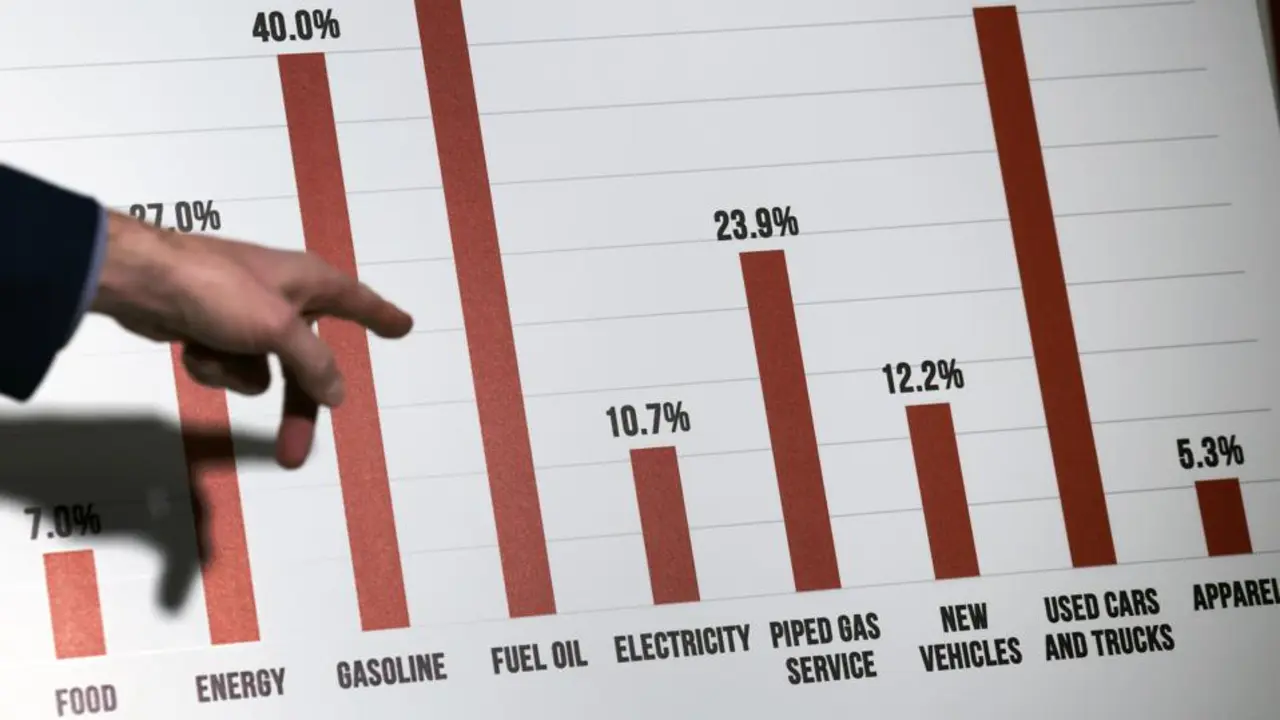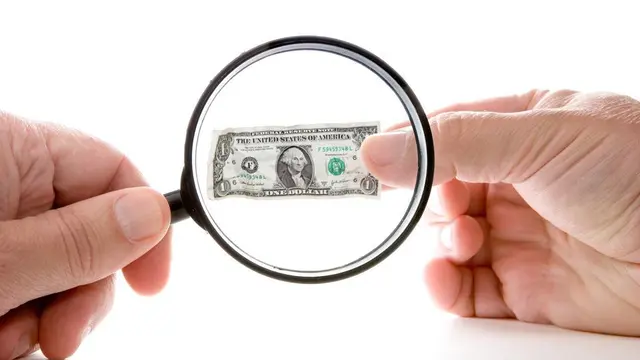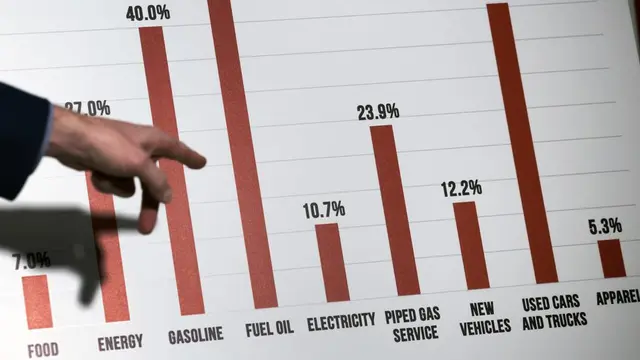Exploring the Relationship between Inflation and GDP Growth
Inflation and GDP growth are two of the most important economic indicators. The two are closely related and can have a significant impact on each other. In this article, we will explore the relationship between inflation and GDP growth, and how changes in one can affect the other.
What is Inflation?
Inflation is a measure of the average prices of goods and services in an economy. It is calculated by tracking the change in prices of a basket of goods and services over time. Inflation is typically expressed as a percentage, with higher numbers reflecting higher prices and vice versa. Inflation is an important indicator of economic health and can have a significant impact on GDP growth.
What is GDP Growth?
GDP growth is a measure of an economy's total output of goods and services. It is typically expressed as a percentage and is used to gauge the health of an economy. GDP growth is also closely linked to inflation, as it is affected by changes in the prices of goods and services.
The Relationship between Inflation and GDP Growth
There is a close relationship between inflation and GDP growth. When inflation is low, GDP growth is generally high, as businesses can produce more goods and services without having to worry about rising prices. Conversely, when inflation is high, GDP growth is typically low, as businesses are unable to keep up with the rising prices of goods and services.
Impact of Inflation on GDP Growth
Inflation can have a significant impact on GDP growth. High inflation can lead to a decrease in GDP growth as businesses are unable to keep up with the rising prices of goods and services. On the other hand, low inflation can lead to an increase in GDP growth, as businesses are able to produce more goods and services without having to worry about rising prices.
Conclusion
Inflation and GDP growth are closely related and can have a significant impact on each other. High inflation can lead to a decrease in GDP growth, while low inflation can lead to an increase in GDP growth. In order to ensure economic stability, it is important to maintain a healthy level of inflation and GDP growth.
Examining the Effects of Inflation on GDP Growth
Inflation has a profound effect on Gross Domestic Product (GDP) growth. Inflation is a measure of rising prices, and it is usually measured in terms of the Consumer Price Index (CPI). The CPI is used to measure the average prices of goods and services purchased by consumers.
The CPI is an important indicator of inflation since it shows how much the average person's purchasing power has changed. When the CPI rises, it signals that prices are increasing, and this is what causes inflation. The higher the inflation rate, the higher the cost of living. This means that people have to spend more money to buy the same goods and services.
High inflation has a negative effect on GDP growth. This is because high inflation reduces the purchasing power of people and businesses. When people have less money to spend, they are less likely to purchase goods and services. This reduces the demand for goods and services, which leads to lower GDP growth.
High inflation also affects businesses. When the cost of goods and services rises, businesses must increase prices to remain competitive. This leads to a decrease in profits, as businesses have to pay more for the same goods and services. This reduces the amount of money businesses can invest in new projects and expansion, which can lead to slower economic growth.
Inflation can also cause interest rates to rise. When interest rates go up, it becomes more expensive for businesses to borrow money. This reduces their ability to invest in new projects and expansion, which can lead to slower economic growth. Additionally, high interest rates can discourage consumer spending, which can further reduce GDP growth.
Inflation can also have an effect on the exchange rate. When the inflation rate is high, the currency will lose value in relation to other currencies. This means that goods and services that are imported into the country will become more expensive. This can reduce the demand for imported goods, leading to slower economic growth.
In conclusion, inflation has a direct effect on GDP growth. High inflation can reduce the purchasing power of people, reduce the profits of businesses, and discourage consumer spending. Additionally, it can lead to higher interest rates, a weaker exchange rate, and reduced demand for imported goods. All of these factors can lead to slower economic growth. Therefore, it is important for governments to monitor inflation and take steps to keep it under control.
Assessing the Impact of Inflation on Economic Growth
Inflation is a complex economic phenomenon that affects the purchasing power of citizens and the economic health of a country. Inflation is a state of economic growth in which prices and wages rise, resulting in a decrease in the value of money. When inflation is high, it can have a profound impact on the Gross Domestic Product (GDP) growth rate and the overall economic health of a nation.
Inflation affects the GDP growth rate in a number of ways. Firstly, high inflation reduces the real income of people, as their wages are no longer able to purchase the same amount of goods and services. As a result, people are less likely to purchase luxury items, as they are more focused on saving money due to the increasing cost of living. This leads to a decrease in consumer spending and a decrease in the GDP growth rate.
In addition, high inflation can lead to an increase in the cost of production, as businesses have to pay higher wages in order to remain competitive. This can lead to a decrease in the production of goods and services, which in turn has a negative impact on the GDP growth rate. Furthermore, high inflation can lead to an increase in borrowing costs, as lenders are less willing to lend money due to the risk of default.
Inflation also affects the GDP growth rate by impacting the exchange rate between different countries. When inflation is high, the exchange rate between countries can become unstable, as there is more money in circulation and the value of money is decreasing. As a result, a country’s currency can become devalued, leading to a decrease in the GDP growth rate.
Finally, high inflation can lead to an increase in the cost of raw materials, as businesses must pay more for the materials they need in order to produce goods and services. This can lead to a decrease in the GDP growth rate, as businesses are unable to produce as much as they would like due to the rising cost of production.
In conclusion, inflation has a direct impact on the GDP growth rate of a country. High inflation can lead to a decrease in consumer spending, an increase in the cost of production, an increase in borrowing costs, an unstable exchange rate, and an increase in the cost of raw materials. All of these factors have a negative impact on the GDP growth rate of a country, leading to economic instability and lower economic growth.
Understanding the Correlation between Inflation and GDP Growth
Inflation has been a major factor in the performance of the GDP growth rate for many years. The correlation between the two is not always clear, but it is important to understand the relationship between inflation and GDP growth in order to make better decisions and understand the overall economic landscape.
Inflation is one of the most important indicators of economic performance, and it is closely related to GDP growth. Generally, when inflation is low, the GDP growth rate tends to be higher. This is because low inflation helps to keep prices stable, which encourages people to spend money, thus driving up economic output.
At the same time, if inflation is too high, it can have a negative impact on the GDP growth rate. High inflation means that prices are rising rapidly, which reduces people's purchasing power and discourages them from spending. This can lead to a decrease in economic output, resulting in a lower GDP growth rate.
It is also important to note that the relationship between inflation and GDP growth is not always linear. In some cases, high inflation can actually lead to higher economic growth, as it can encourage investment and stimulate economic activity.
In conclusion, it is clear that the relationship between inflation and GDP growth is complex and can vary depending on the economic circumstances. It is important to understand the relationship between the two in order to make informed decisions and understand the overall economic landscape.


